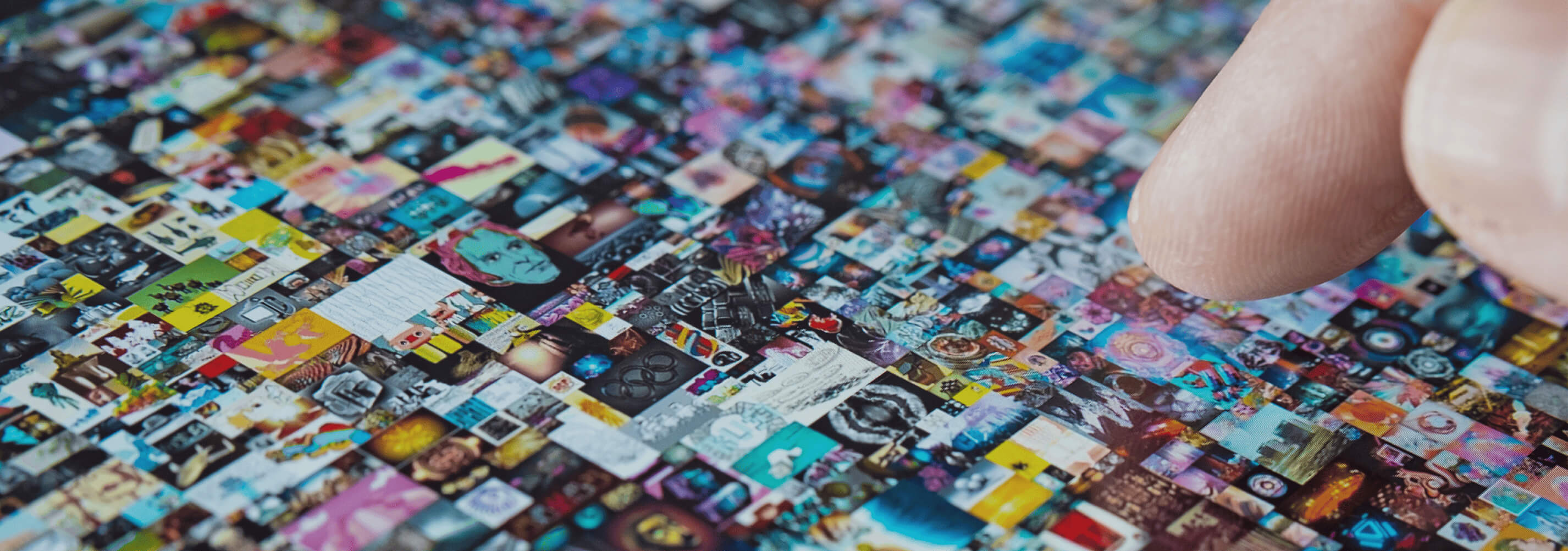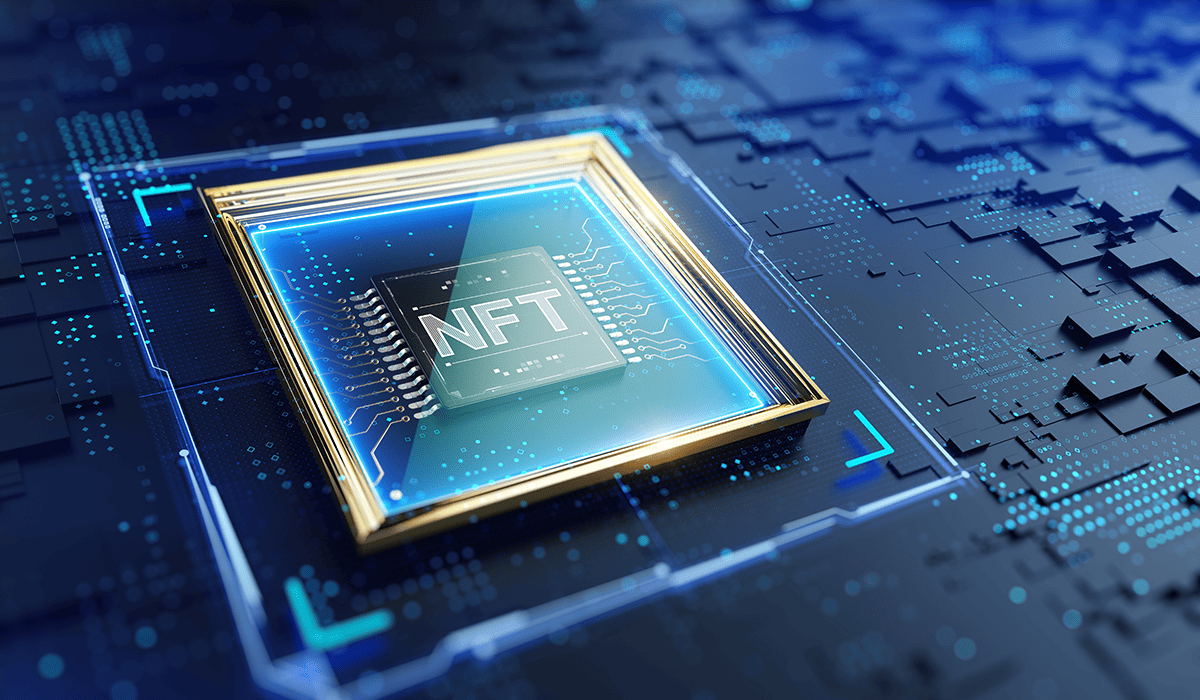
An NFT is a digital asset that’s typically unique or rare and has a one-off code by which it can be identified. NFTs have existed since around 2014, but with the rise of cryptocurrencies and digitisation, they’ve become increasingly popular in recent years as a means of buying and selling digital assets. Naturally, the popularity of NFT marketplaces is booming.
Essentially, they’re a digital collectors’ item. According to Forbes, the value of NFT assets traded since 2017 is approximately £123 million, reaching a total of $340.0 million USD in 2020. And it’s a market that’s predicted to grow by a CAGR of 39.6% by 2030.
Non-fungible tokens are based on blockchain technology, and they represent digital assets from artworks to playlists/soundtracks and articles, to in-game objects or assets—such as digital houses.
So, why have they become so popular? Well, while it’s true that anyone can access these digital creations online, what a NFT does is establish and track ownership in a manner that’s completely immutable and infallible, via blockchain networks. And why would that be important to an art collector, for example, when anyone can just download the work anyway? Well, as Forbes puts it, it’s a matter of owning the “digital bragging rights” to a piece being almost as important as owning the piece itself.
But, in order to trade NFTs, a dedicated NFT marketplace is needed. So, for innovative businesses looking to create a NFT marketplace, the future looks bright. NFT marketplaces are digital platforms that allow owners to buy, sell—often at a fixed rate—store, display and create (in some cases) NFT tokens. They’re the Amazons of the virtual world. Since NFT marketplace development requires specific technical skills and expertise, it may be beneficial to enlist the help of a blockchain software development company in order to ensure the success of your platform build.
“NFT marketplaces allow digital collectors to buy, sell and create their own tokens that represent ownership of unique, tangible and intangible items”. - Coindesk.com.
Why are NFT marketplaces needed?
The key difference between NFTs and currencies, digital or traditional, is that they each have a specific value rather than a flat rate, which is based on the token’s individual characteristics. This means that they can’t be mutually exchanged, like-for-like.
These non-fungible tokens also cannot be bought or sold via centralised or decentralised crypto exchanges, so the only way to trade NFTs is to use an online NFT marketplace. And this means that NFT marketplace development is going to become increasingly lucrative for NFT marketplace development companies.
Benefits of NFT marketplaces
Because NFT marketplaces are built on blockchain technology, they yield the same benefits, which include:
- Transparency - the real-time and immutable nature of blockchain means that transactions conducted in an NFT marketplace are fully visible and impossible for tampering.
- Decentralisation - you can replicate and distribute all data between different nodes in the network. And, each time a new block is added, the network is updated and every peer has access to view the information
- Security - blockchain equips NFT marketplaces with in-built security features, cryptography and consensus algorithms that safeguard against online frauds, breaches, or other cyber security threats.

NFT marketplace development process explained
The first thing to know is that, typically speaking, niche NFT marketplaces are more desirable than generalised ones, such as an NFT platform specialising in the digital arts.
NFT marketplace development vendors can help companies create marketplace apps that allow users of NFT to efficiently perform the tasks they need using one straightforward interface. When considering the features of your NFT platform, it's worth including the following in your list of requirements:
- Storefront
- Dashboard
- NFT Minting
- Listings and collections creation
- Listing status and token details
- NFT Filters
- Advanced search capabilities
- Bid-and-Buy functionality
- Wallet integration
- Ratings and reviews
Once you've defined your niche, you can enlist the expertise of your chosen NFT marketplace development company to help you bring your project to life. This partner will be able to help you with the end-to-end development of your NFT platform, which will generally include the following steps:
- Choosing your blockchain - Ethereum, Binance Smart Chain, Solana, Cardano, and Polygon are the most commonly used.
- Defining the project UX Design - Simplifying and optimising your UX is the key to building a successful NFT marketplace platform. With the help of a NFT marketplace development company, you can create a user interface that's intuitive, straightforward and pleasurable to use.
- Front-end development - A tried-and-tested NFT marketplace development company can help you design the framework for your NFT platform, guaranteeing superior functionality and easy adoption by your users.
- Implementing smart contracts - Every operational task in a NFT marketplace is carried out via smart contracts. They trigger all of the processes that take place in a NFT platform. A NFT marketplace development company will help you create and implement these smart contracts to get the ball rolling.
- Setting up storage - All NFTs metadata associated with a particular token is typically stored outside of blockchain since storing data in the blockchain is expensive. One of the solutions is to store metadata in InterPlanetary File Systems (IPFS) - a peer-to-peer network for collating and sharing data in a distributed file system.
- Integration - This is the process of developing front and back-end interfaces to interact with the smart-contracts business logic deployed on the blockchain network.
- Testing - Testing is a crucial step in NFT marketplace development, allowing developers to identify and iron out any bugs before deployment.
- Deployment - After several rounds of thorough testing, your NFT marketplace platform is ready to be deployed to production.
The above describes the basic process of building an NFT marketplace from scratch with the help of an expert blockchain software development team. But you can also create a White Label NFT marketplace, which is basically a clone on an NFT marketplace that can be later customised according to your needs.
What are the business use cases for NFTs?
While there's, undoubtedly, a lot of hype around NFTs right now, it's more than a passing fad. So NFT marketplace development is going to come to play a much bigger role in the virtual world than it does right now. And what's compelling for businesses thinking about branching out into NFT marketplace development is that, aside from the arts and in-game commodity trading, NFTs present some promising business uses. Here are just a fraction of them.
Gaming
The gaming industry is huge. As of 2021, the market was worth $180 billion in 2021 and is predicted to reach a staggering $256.97 billion by 2025. And one area that's rapidly expanded within gaming is the trading of digital commodities, in games like the massively popular Axie Infinity, a NFT platform and battling game where players can collect and trade little digital creatures called Axies. The current Axie Infinity trading price sits at $63.89 USD, with a 24-hour trading volume of $600,737,442 USD. Gamers who get good at what they do can potentially collect, breed and trade their characters, then leave the game with crypto in the 'bank'.
What's interesting is that, because of the longer development lifecycle of a game compared with, say, a digital artwork, the uptake still hasn't reached its peak. This means that now could be a very lucrative time for NFT platform developers to jump on the bandwagon.
DeFi NFTs
'DeFi' stands for decentralised finance, which is based on the blockchain network. In the crypto world era, NFTs can be used as collateral to pay off financial obligations.
So, imagine you spent a large crypto sum on purchasing an in-game asset or digital artwork. This can be put down to cover a debt and then returned to you once the debt is paid, a bit like a digital pawnshop. And, from the perspective of the lender, there's no risk if you default on your loan because, with smart contracts, the NFT is automatically transferred to them if you can't pay your debt.
Fashion
In early 2021, virtual fashion brand RTFKT sold a digital jacket for over $125,000. Then, last October, Dolce & Gabbana sold a set of NFT garments for $6 million, bought by Red DAO, among others, a decentralised crypto-community organisation that invests in digital fashion.
And there are an increasing number of small and innovative NFT-first fashion brands that are designing digital garments, sometimes alongside physical pieces, to sell to crypto-savvy consumers. This virtual couture can be worn using virtual and augmented reality technologies and has even been featured at London Fashion Week. And, since haute couture is the ultimate collectors' item, it only makes sense that it moves into the realms of the NFT; the digital collectible.
Event ticketing
One more interesting use case is applying NFT to ticketing so that users can interact with venues to purchase tickets in a peer-to-peer manner, excluding the need for a middleman. Blockchain is used here as a third-party platform to facilitate transactions and NFT - to verify a ticket is authorised to a specific person. The proof of ownership is stored on the blockchain and secured by NFT's unique properties that cannot be changed, deleted or substituted with another token.
Media and the entertainment industry can also use NFTs to replicate privilege cards functionality, offering rewards to incentivise their audience with loyalty points and other customer perks. An NFT tracks a history of all transactions, so the venue will see which events the user attended and can provide this person with tailored offerings, boosting engagement and driving more sales.
NFT community platforms
But, many would argue, what is the point of buying and owning NFT couture, multi-million dollar digital artworks or pieces of music if you have nowhere to display them? This is where NFT platforms, or communities, come in. It's highly likely that, very soon, we'll see NFT platforms springing up that are designed as an appealing environment in which NFT buyers can gather, virtually, to show off their digital assets, meet with like-minded collectors and talk about their shared interests.
Some already exist, but it's predicted that this trend will grow and lead to the development of more and more immersive NFT platform environments, built for working, collaborating and socialising with others in the virtual world.
Summary
As the world moves increasingly online, NFT marketplace development is set to boom. If you're looking to build your own NFT platform, you'll want to consider the above features, scope out your niche and choose the right software company to help you with NFT marketplace development and deliver your vision.
See how ELEKS' blockchain expertise could help you meet your NFT marketplace development goals. Chat to one of our specialists today.
Related Insights








The breadth of knowledge and understanding that ELEKS has within its walls allows us to leverage that expertise to make superior deliverables for our customers. When you work with ELEKS, you are working with the top 1% of the aptitude and engineering excellence of the whole country.

Right from the start, we really liked ELEKS’ commitment and engagement. They came to us with their best people to try to understand our context, our business idea, and developed the first prototype with us. They were very professional and very customer oriented. I think, without ELEKS it probably would not have been possible to have such a successful product in such a short period of time.

ELEKS has been involved in the development of a number of our consumer-facing websites and mobile applications that allow our customers to easily track their shipments, get the information they need as well as stay in touch with us. We’ve appreciated the level of ELEKS’ expertise, responsiveness and attention to details.

